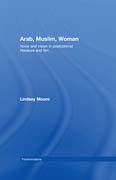
Arab, muslim, woman: voice and vision in postcolonial literature and film
Moore, Lindsay
Given a long history of representation by others, what themes and techniques do Arab Muslim women writers, filmmakers and visual artists foreground in their presentation of postcolonial experience? Lindsey Moore's groundbreaking bookdemonstrates ways in which women appropriate textual and visual modes of representation, often in cross-fertilizing ways, in challenges to Orientalist/colonialist, nationalist, Islamist, and 'multicultural' paradigms. She provides anaccessible but theoretically-informed analysis by foregrounding tropes of vision, visibility and voice; post-nationalist melancholia and mother/daughter narratives; transformations of 'homes and harems'; and border crossings in time,space, language, and media.In doing so, Moore moves beyond notions of speaking or looking 'back' to encompass a diverse feminist poetics and politics and to emphasize ethical forms of representation and reception. "Arab, Muslim, Woman" is distinctive in the eclectic body of work that it brings together. Discussing Algeria, Egypt, Jordan, Lebanon, Morocco, the Palestinian territories, and Tunisia, as well as postcolonial Europe, Moore argues for better integrationof Arab Muslim contexts in the postcolonial canon. In a book for readers interested in women's studies, history, literature, and visual media, we encounterwork by Assia Djebar, Mona Hatoum, Fatima Mernissi, Ahlam Mosteghanemi, Nawalel Saadawi, Leila Sebbar, Zineb Sedira, Ahdaf Soueif, Moufida Tlatli, Fadwa Tuqan, and many other women.
- ISBN: 978-0-415-40416-7
- Editorial: Routledge
- Encuadernacion: Cartoné
- Páginas: 189
- Fecha Publicación: 01/06/2008
- Nº Volúmenes: 1
- Idioma: Inglés
